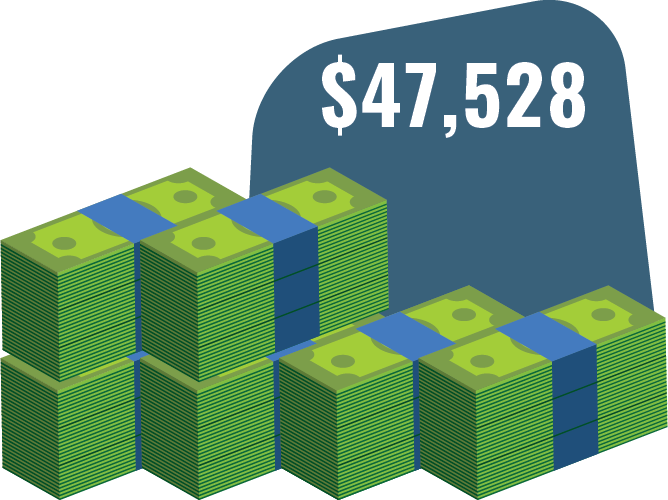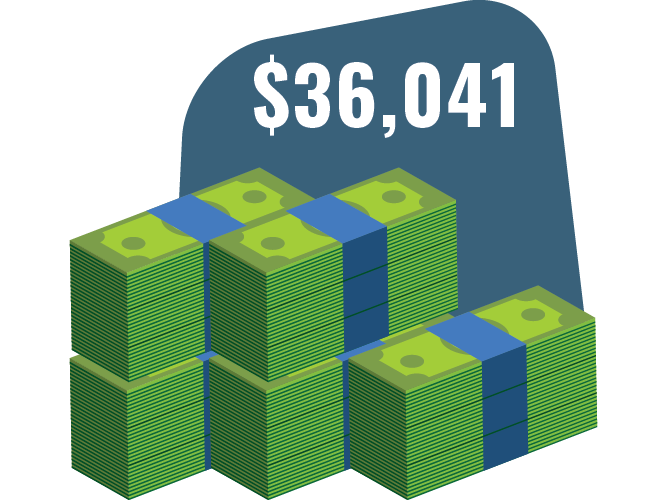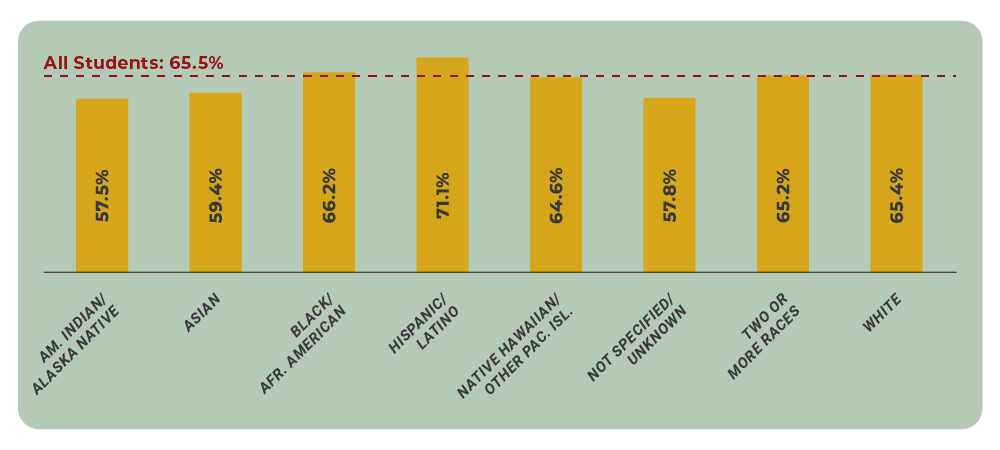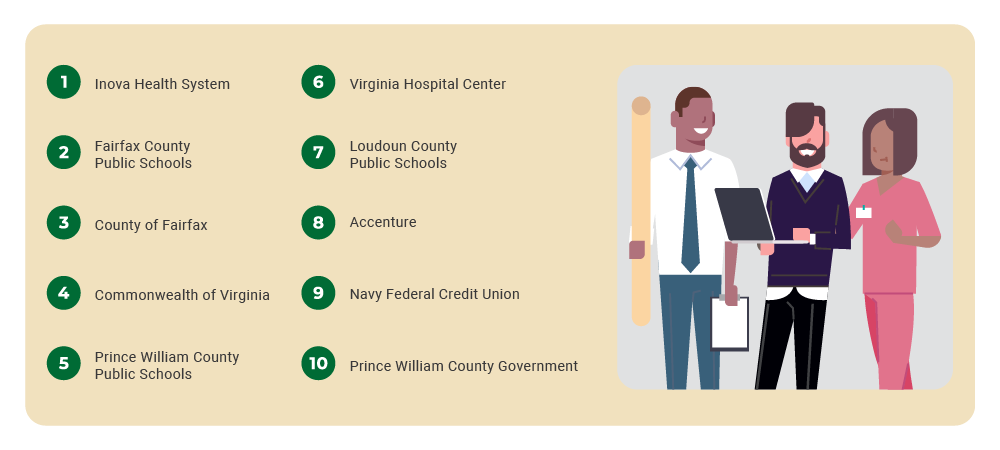NOVA Employment Outcomes
Post GraduationNOVA Employment Outcomes
The Importance of Measuring Student Employment Outcomes
While employment is not the only aim of postsecondary education, it has become an increasingly important factor for students in deciding whether to pursue a degree or credential. In a 2021 national survey of college and university alumni, the Strada Center for Education Consumer Insights found that, on average, respondents’ strongest motivations for pursuing higher education were career-related: qualifying for good jobs, being able to support themselves and their families, and gaining skills to be successful in work.1 As a result, post-completion employment and wage outcomes are valuable metrics to consider when evaluating student success, particularly when considering “applied” degree and certificate programs intended to develop career and technical skills.2
This issue of Data Spotlight highlights the different sources of student employment and wage data that are available, including their differences and limitations, and considers data for Northern Virginia Community College (NOVA) graduates alongside graduates of other 2-year institutions, statewide and nationally. The back cover provides information on career resources and tools available to NOVA students, faculty, and staff.
College Scorecard
One of the most prominent efforts to track and provide information on student employment outcomes at the national level has been the U.S. Department of Education’s College Scorecard.3 In addition to highlighting graduation rates and average annual costs for all postsecondary institutions eligible to receive federal financial aid, the Scorecard also provides median earnings for students after 10 years. However, these data are only provided for students who received federal student aid, regardless of whether they completed a degree or credential
Median Earnings After 10 years, Federal Student Aid Recipients


Northern Virginia Community College
All U.S. 2-Year Institutions
College Scorecard
Median Earnings After 10 years, Federal Student Aid Recipients

Northern Virginia Community College

All U.S. 2-Year Institutions
Postsecondary Employment Outcomes
PSEO data for students who graduated between 2001 and 2005 suggest that the share of NOVA graduates employed full-time following graduation is lower than the share of graduates from all other VCCS institutions. However, it is important to remember that this data does not account for graduates who are pursuing further education, which may account for some of the discrepancy. A decrease in employment rates between year five and year ten is consistent across the PSEO dataset.
Median Earnings After 10 years, Federal Student Aid Recipients


PSEO data also suggest that associate degree earners from NOVA, from 2001 to 2005, initially earn lower wages one-year post-graduation than students earning certificates, but that their wages increase more rapidly over time, with a median wage of over $67,000 ten years following graduation.4
Median Post-Graduation Wage by Degree Level


Certificate, <1 Year


Northern Virginia Community College Data
NOVA also receives student-level employment and wage data from the Virginia Employment Commission (VEC), which allows for disaggregation based on student characteristics.5 However, these data are only available for graduates employed within the Commonwealth and exclude federal workers, student workers, those in the military, farm workers, and those who are self-employed.
With those limitations in mind, the chart below presents employment and wage outcomes for graduates from 2015 to 2020 based on this VEC data set. Due to the differences in data source and time frame, caution should be used in making comparisons between these data and those presented on the opposite page. Among NOVA graduates from 2015 to 2020, Hispanic/Latino and Black/African American students had higher than average rates of employment one-year post-graduation. Like the PSEO data, these measures do not account for students who are not employed due to enrollment in additional education.
Over the coming year, NOVA’s Labor Market Intelligence team, within the Office of Strategic Insights, will be conducting additional analysis utilizing these data sets. Please stay tuned for more!
Learn More
Resources for Students, Faculty, and Staff
Additional research from Strada, in partnership with Gallup, found that while only 32% of U.S. adults consulted informal school-based sources (i.e., teachers, faculty, or non-advising staff) for advice regarding their field of study and career path, 78% of those who did found their advice helpful.6 This was second only to the share of respondents who found informal work-based sources helpful. It is clear, then, that any college faculty or staff who regularly meet students should be well-prepared to have career-related conversations with them. Below are a few resources offered at NOVA, as well as through state and federal agencies, that faculty, staff, and others can utilize when guiding students along their academic and career path.

Career Services
Career Services offers a variety of resources to help students explore career paths and reach their academic and career goals. This includes hosting in-person and virtual career events where students can speak directly to employers in their field of interest, coordinating paid internships, and providing career counseling.
To access these resources, or set-up a counseling appointment, visit: https://www.nvcc.edu/career-services

Career Connections
Career Connection is an online job board and career services platform that is free to use for students and alumni. Students can use the tool to search and apply to jobs and internships, as well as build a resume, and practice mock interviews. Career Services staff also work to ensure that any job posted in the system is vetted and legitimate.
To access Career Connection, visit: https://www.nvcc.edu/career-services/career-connection.html

NOVA Labor Market Information
NOVA’s Labor Market Intelligence (LMI) team, within the Office of Strategic Insights, provides data on the regional job market, including resources for exploring and navigating in-demand careers. Faculty and staff can also request data to determine whether specific occupations, programs, credentials, or skills are regionally in-demand.
To access LMI resources and research, visit: https://www.nvcc.edu/lmi

State and Federal Resources
The following state and federal resources also provide helpful career exploration and navigation information:
State and local data: https://virginiaworks.com/
Occupational information: https://www.bls.gov/ooh/
Career navigation help: https://www.mynextmove.org/
Find training and jobs: https://www.careeronestop.org/
Citations
- Dave Clayton and Nichole Torpey-Saboe, Student Outcomes Beyond Completion: National Findings from the 2021 Strada Alumni Survey, October 27, 2021, Strada Center for Education Consumer Insights, https://cci.stradaeducation.org/pv-release-oct-27-2021/.
- Mark Schneider, Tod R. Massa, and Ben Vivari, The Earning Power of Recent Graduates from Virginia’s Colleges and Universities: How are Graduates from Different Degree Programs Doing in the Labor Market?, College Measures, n.d., https://www.air.org/sites/default/files/downloads/report/Virginia_EMS_Report1_0.pdf..
- U.S. Department of Education (2022), Northern Virginia Community College, Washington, D.C., accessed on November 28, 2022 at https://collegescorecard.ed.gov/school/?232946-Northern-Virginia-Community-College.
- U.S. Census Bureau (2022), Post-Secondary Employment Outcomes Data (Experimental) (2001-2015) [computer file], Washington, D.C.: U.S. Census Bureau, Longitudinal-Employer Household Dynamics Program [distributor], accessed on November 28, 2022 at https://lehd.ces.census.gov/data/pseo_experimental.html. R20222Q2 [version].
- Office of Strategic Insights, Northern Virginia Community College.
- Strada Education Network and Gallup, Inc., Major Influence: Where Students Get Valued Advice on What to Study in College, September 2017, https://news.gallup.com/reports/219236/major-influence-students-advice-study.aspx.
- Dave Clayton and Nichole Torpey-Saboe, Student Outcomes Beyond Completion: National Findings from the 2021 Strada Alumni Survey, October 27, 2021, Strada Center for Education Consumer Insights, https://cci.stradaeducation.org/pv-release-oct-27-2021/.
- Mark Schneider, Tod R. Massa, and Ben Vivari, The Earning Power of Recent Graduates from Virginia’s Colleges and Universities: How are Graduates from Different Degree Programs Doing in the Labor Market?, College Measures, n.d., https://www.air.org/sites/default/files/downloads/report/Virginia_EMS_Report1_0.pdf..
- U.S. Department of Education (2022), Northern Virginia Community College, Washington, D.C., accessed on November 28, 2022 at https://collegescorecard.ed.gov/school/?232946-Northern-Virginia-Community-College.
- U.S. Census Bureau (2022), Post-Secondary Employment Outcomes Data (Experimental) (2001-2015) [computer file], Washington, D.C.: U.S. Census Bureau, Longitudinal-Employer Household Dynamics Program [distributor], accessed on November 28, 2022 at https://lehd.ces.census.gov/data/pseo_experimental.html. R20222Q2 [version].
- Office of Strategic Insights, Northern Virginia Community College.
- Strada Education Network and Gallup, Inc., Major Influence: Where Students Get Valued Advice on What to Study in College, September 2017, https://news.gallup.com/reports/219236/major-influence-students-advice-study.aspx.
Learn More
Resources for Students, Faculty, and Staff
NOVA is deeply committed to the values of access, opportunity, student success, and excellence. In particular, the College aims to provide students with access to high-quality, post-secondary education in the Northern Virginia region, as well as to promote success by preparing students to graduate, transfer, and enter the workforce with improved educational and labor market skills.
Student equity is at the forefront of programs and initiatives at NOVA. NOVA provides a variety of services to help every student succeed, many of which may be particularly helpful to students from historically underrepresented populations.

Career Services
To access these resources, or set-up a counseling appointment, visit: https://www.nvcc.edu/career-services

Career Connections
To access Career Connection, visit: https://www.nvcc.edu/career-services/career-connection.html

NOVA Labor Market Information
To access LMI resources and research, visit: https://www.nvcc.edu/lmi

State and Federal Resources
State and local data: https://virginiaworks.com/
Occupational information: https://www.bls.gov/ooh/
Career navigation help: https://www.mynextmove.org/
Find training and jobs: https://www.careeronestop.org/
Citations
- Dave Clayton and Nichole Torpey-Saboe, Student Outcomes Beyond Completion: National Findings from the 2021 Strada Alumni Survey, October 27, 2021, Strada Center for Education Consumer Insights, https://cci.stradaeducation.org/pv-release-oct-27-2021/.
- Mark Schneider, Tod R. Massa, and Ben Vivari, The Earning Power of Recent Graduates from Virginia’s Colleges and Universities: How are Graduates from Different Degree Programs Doing in the Labor Market?, College Measures, n.d., https://www.air.org/sites/default/files/downloads/report/Virginia_EMS_Report1_0.pdf..
- U.S. Department of Education (2022), Northern Virginia Community College, Washington, D.C., accessed on November 28, 2022 at https://collegescorecard.ed.gov/school/?232946-Northern-Virginia-Community-College.
- U.S. Census Bureau (2022), Post-Secondary Employment Outcomes Data (Experimental) (2001-2015) [computer file], Washington, D.C.: U.S. Census Bureau, Longitudinal-Employer Household Dynamics Program [distributor], accessed on November 28, 2022 at https://lehd.ces.census.gov/data/pseo_experimental.html. R20222Q2 [version].
- Office of Strategic Insights, Northern Virginia Community College.
- Strada Education Network and Gallup, Inc., Major Influence: Where Students Get Valued Advice on What to Study in College, September 2017, https://news.gallup.com/reports/219236/major-influence-students-advice-study.aspx.





